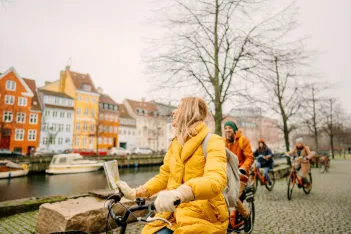CUE topic 2: Sustainable tourism – circular benefits and challenges

Challenge description
Many regions and cities across Europe face increasing pressure from tourism. Furthermore, there is opportunity to build sustainable tourism practices before this pressure occurs and reaches a damaging level. While tourism is a vital contributor to local economies, generating employment opportunities and income flows, it also creates significant challenges. These include rising costs of housing and food, gentrification, strains on local infrastructure, land use pressures, increased waste production, impacts on culture and heritage, as well as environmental degradation.
This topic explores how these effects of tourism impact and influence the quality of life for local populations and environments. This topic not only considers the existing effects on urban areas already under pressure from tourism, but also the opportunities for urban areas rising in tourist popularity or those seeking to develop tourism in a sustainable way (i.e. prevention of and learning from adverse effects). A key challenge is identifying how circular and green solutions can help mitigate such issues, fostering sustainable and inclusive tourism practices.
Scope
Tourism provides both opportunities and challenges for local communities. Identifying desirable tourism models and assessing impacts holistically are key to achieving a balance that benefits all stakeholders. Proposals under this topic must address the multifaceted challenges of sustainable tourism in both existing urban areas and new developments. Projects should focus on innovative solutions, instruments, strategies and regulations, incentives (such as tax incentives), at local, municipal and regional level. Project should, furthermore, focus on addressing rising housing and food prices, gentrification, waste management, infrastructure provision, as well as the environmental impacts and other challenges of tourism, and related real estate developments; whilst ensuring tourism benefits are equitably distributed across local communities.
Under this topic there is also the possibility to identify circular solutions that can reduce waste from tourism by promoting sustainable practices such as refillable packaging, local recycling systems and responsible consumption in tourist hotspots. The topic also emphasises the importance of promoting slow and eco-conscious tourism models that can decrease the environmental footprints, while fostering deeper cultural exchanges and supporting local and indigenous communities so that the identity of the urban environment belongs to the local population and is not lost to the negative effects of tourism. Tourism provides both opportunities and challenges for local communities and identifying tourism models and holistic impact assessment is key to achieving a balance that benefits all stakeholders. This topic also emphases that strengthening the integration of local food systems into tourism services can enhance proximity food chains, creating direct connections between producers and tourism stakeholders while reducing supply chain emissions.
Project proposals submitted under this topic should address one or several of the following issues:
- Gentrification, housing and food prices: How can cities and regions tackle tourism-driven gentrification, and rising housing and food prices, whilst maintaining local affordability, creativityand social, economic and cultural vibrancy.
- Innovative policies for sustainable tourism: What innovative policies, strategies and regulatory frameworks can ensure affordable housing while balancing vibrant tourism economies and equitable distribution of visitor flows at a local level?
- Equitable distribution of tourism benefits: How can tourism benefits be more equitably distributed across local communities, ensuring shared economic and social gains?
- Supporting local entrepreneurship in tourism: What tourism models can promote community-driven entrepreneurship, revenue sharing and participatory planning practices to counter real estate speculation and overtourism?
- Sustainable tourism practices: What sustainable practices can reduce tourism-related waste and integrate circular economy principles, such as refillable packaging, local recycling systems and responsible consumption?
- Integrating local food and sustainable sourcing: How can tourism businesses strengthen links with local food producers and overcome logistical challenges to promote sustainable food sourcing and support regional economies?
Expected outputs and outcomes
Rather than focusing on isolated technical solutions, projects are expected to approach this topic through systems thinking and place-based strategies related to this topic. Project outcomes should be both impact-oriented and process-driven, aiming to be as concrete and user-centred as possible. Projects should clearly define their expected outputs in relation to the chosen question. Expected outputs include, but are not limited to:
- Evidence-based recommendations for policymakers, local governments and businesses.
- Innovative models and strategies that can be piloted or implemented in tourism destinations.
- Practical tools and frameworks for integrating circular urban economy principles into tourism.
- Case studies and best practices from various tourism hotspots in Europe and globally.
- Approaches to align tourism goals with the goals that benefit local community.
- Policy recommendations that address tourism-driven gentrification in a neighbourhood.